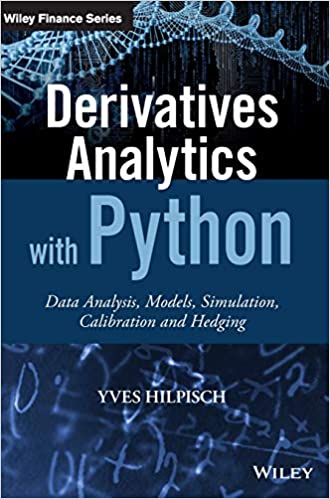By - Yves Hilpisch
Data Analysis, Models, Simulation, Calibration and Hedging
Derivatives Analytics with Python shows you how to implement market-consistent valuation and hedging approaches using advanced financial models, efficient numerical techniques, and the powerful capabilities of the Python programming language. This unique guide offers detailed explanations of all theory, methods, and processes, giving you the background and tools necessary to value stock index options from a sound foundation. You’ll find and use self-contained Python scripts and modules and learn how to apply Python to advanced data and derivatives analytics as you benefit from the 5,000+ lines of code that are provided to help you reproduce the results and graphics presented. Coverage includes market data analysis, risk-neutral valuation, Monte Carlo simulation, model calibration, valuation, and dynamic hedging, with models that exhibit stochastic volatility, jump components, stochastic short rates, and more. The companion website features all code and IPython Notebooks for immediate execution and automation.Python is gaining ground in the derivatives analytics space, allowing institutions to quickly and efficiently deliver portfolio, trading, and risk management results. This book is the finance professional’s guide to exploiting Python’s capabilities for efficient and performing derivatives analytics.
- Reproduce major stylized facts of equity and options markets yourself
- Apply Fourier transform techniques and advanced Monte Carlo pricing
- Calibrate advanced option pricing models to market data
- Integrate advanced models and numeric methods to dynamically hedge options
Recent developments in the Python ecosystem enable analysts to implement analytics tasks as performing as with C or C++, but using only about one-tenth of the code or even less. Derivatives Analytics with Python — Data Analysis, Models, Simulation, Calibration and Hedging shows you what you need to know to supercharge your derivatives and risk analytics efforts.

Dr. Yves J. Hilpisch is founder and managing partner of The Python Quants (http://tpq.io), a group that focuses on the use of open source technologies for financial data science, algorithmic trading and computational finance. He is the author of the books Python for Finance (O’Reilly, 2014), Derivatives Analytics with Python (Wiley, 2015) and Listed Volatility and Variance Derivatives (Wiley, 2017). Yves lectures on computational finance at the CQF Program (http://cqf.com), on data science at htw saar University of Applied Sciences (http://htwsaar.de), and is the director for the online training program leading to the first Python for Finance University Certificate (awarded by htw saar).

